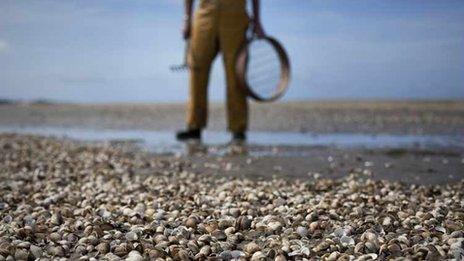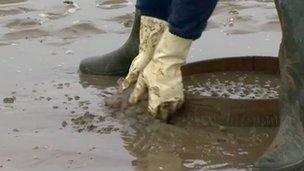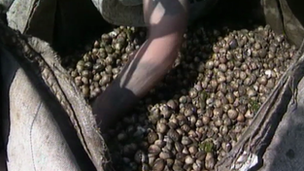Cockling: Talks on doubling Dee Estuary picker licences
- Published

The number of cockle pickers on the Dee Estuary may double to 100
Harvesting a north Wales cockle bed has proved so successful talks are under way about doubling the number of people licensed to work it.
Fifty people are permitted to gather cockles in the Dee Estuary, Flintshire, but twice that number are needed to meet the cost of managing the fishery.
A consultation on the move continues until the end of the year.
Meanwhile, the first apprentice cockler to qualify for a full licence has been presented with a certificate.

The Dee Estuary supports 50 people licensed to cockle for a living six months of the year
Wayne Bradley, 26, from Holywell, Flintshire, has worked alongside his father, Wayne senior, since 2009 to learn how to pick the moment to riddle, or sieve, for legal-size cockles during the six months from July to December that the beds are open.
He becomes the 51st person entitled to collect the shellfish, with two others also in apprenticeship.
The cocklers beach their boats at low tide over the cockle beds to hand pick the cockles.
Proposals by Environment Agency Wales include increasing the number of licensed cocklers to 100. There are more than 100 on the waiting list.
If the numbers remain at 50, the annual licence fee will have to almost double from the current £992 to £1,831.
The move is the result of a four-year programme to stop a repeat of scenes when up to 500 cockle "fishermen" would descend on the mudflats and clear out the sellable clams in just two or three days.
The restrictions, aimed at allowing up to a third of the cockles to be picked, leaving a third for wading birds like oystercatcher, and a third to breed, have been hailed as a success.
The Marine Stewardship Council (MSC) has given the harvest the thumbs-up as a "certified sustainable seafood".

The cockles are mainly exported in a business worth £2.5m a year
Describing the cockle beds as a "well-managed, small and discrete fishery with low environmental impact," the endorsement opens up cockle sales to outlets which only buy accredited sustainable products.
The pickers can gather up to 300kg of cockles every day. The idea is that putting a daily quota in place encourages licensees to crop the oldest and biggest cockles, leaving small cockles to grow later in the season.
Last season the licensed cockle pickers gathered 1,250 tonnes of cockles, worth £2.5m in overseas markets, twice as much as the season before.
A so-called "cockle cam" with heat sensors that can record images up to three miles away is one of the methods used to regulate the beds' harvest.
Environment Agency Wales brought 12 prosecutions for illegal cockling and suspended 15 licences in the 12 months to April year.
A spokesman said the proposals sought to make the management of the beds more flexible, based on the experience gained over the past four years, as well as cover the £47,525 gap in management costs.
He said: "Now that we know the true costs of running it and enforcing it, it can either stay as it is, and the public purse picks the difference or the current licensees pay more or you double the number of licences.
"Those cocklers know the estuary very well. You have got to know what you are doing with the tides there."
But the cocklers are against the licence fee almost doubling and believe local people will not benefit enough if more licences are issued, according to veteran picker Keith Marland, 67, who has worked the beds for 35 years.
He said: "Why should we be only fishery that pays for itself? Now that we have seen the breakdown of costs, it needs to be explained why the cost of enforcement has doubled.
"The other alternative is to have 100 licenses. That is not practical because there's no way for 100 boats to land a catch.
"I've got mixed feelings. I don't mind if they want to put out 100 licences as long as local people get the licences, but that won't be the case."
- Published2 July 2012
- Published26 March 2012
- Published11 May 2012
- Published31 October 2011